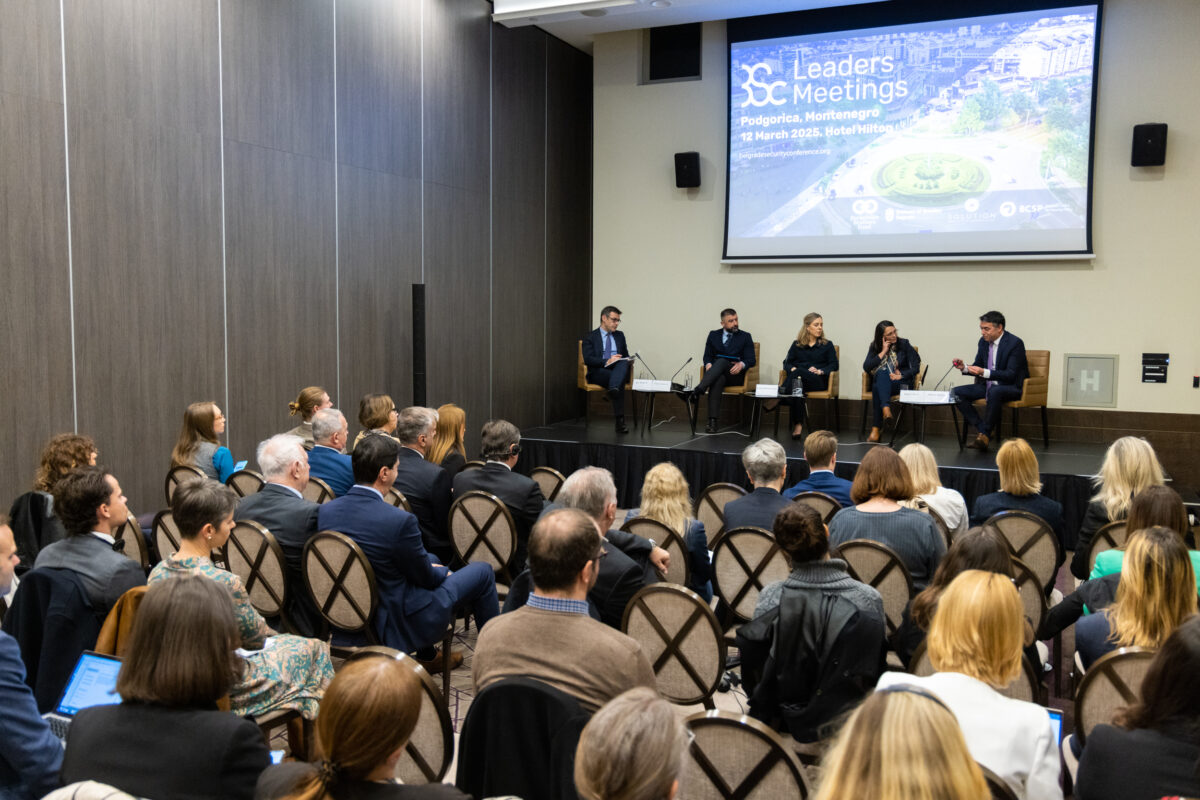The Western Balkans – A Test for Europe’s Security and Democratic Resilience


“Sweden is a strong and long-term supporter of EU enlargement. This could be the beginning of the end of the negotiations for Montenegro,” stated Jessica Rosencrantz, the Minister for EU Affairs of Sweden, at the fourth in a series of BSC Leaders Meetings held in Podgorica on 12th March 2025.
Besides the Swedish Minister for EU affairs, the panel discussion under the title “Montenegro’s European Dream: A Success Story for the Region?” featured prominent speakers, including Todor Goranović, Adviser to the Prime Minister of Montenegro for Security and Defence; Vanja Ćalović, Executive Director of MANS; and Nikola Dimitrov, President and Co-Founder of Solucija, who also served as the former Deputy Prime Minister and Minister of Foreign Affairs of North Macedonia. The discussion was moderated by Igor Bandović, Director of the Belgrade Centre for Security Policy.

During his opening remarks, Igor Bandović emphasised the critical role of the Western Balkans in Europe’s security landscape. He stated, “As Europe faces growing instability and geopolitical challenges, the Western Balkans remain a key test for the continent’s security and democratic resilience.” Bandović acknowledged Montenegro’s European integration as a notable success but cautioned that ongoing political and security issues necessitate renewed commitment from both regional leaders and the European Union. He highlighted the urgent need for democratic reforms, enhanced regional cooperation, and a clear EU commitment to stability in the region. “Our role is to foster dialogue, provide expertise, and advocate for policies that ensure lasting stability in the Balkans,” he concluded, underscoring BCSP’s dedication to supporting these objectives through informed advocacy and collaboration.

Sweden’s Minister for EU Affairs, Jessica Rosencrantz, emphasised her country’s unwavering support for EU enlargement. She noted that the current security landscape has invigorated the EU accession process, stating, “Sweden is a strong and long-term supporter of EU enlargement. The current security environment has brought new momentum to the EU process, and by keeping up the pace on the necessary reform work, Montenegro is not only inspiring other candidate countries to follow, but also contributing to the security and stability on our entire continent.” Rosencrantz highlighted that this momentum could signify a pivotal moment in Montenegro’s negotiations, suggesting that it might be “the beginning of the end of the negotiations for Montenegro.” Her remarks underline Sweden’s commitment to fostering stability and cooperation within Europe through the enlargement process.
The discussion focused on several critical themes, such as opportunities and challenges Montenegro faces on its path to EU membership, remaining hurdles to conclude accession negotiations by 2028 and lessons other Western Balkan nations can learn from Montenegro’s progress.

Todor Goranović, Adviser to the Prime Minister of Montenegro for Security and Defence, highlighted Montenegro’s progress in its EU integration process, describing it as a source of encouragement for the country, but also for the Western Balkans. He pointed out that the recent closure of negotiation chapters, after years of delay, represents a positive step forward. Goranović also emphasised Montenegro’s role as an example for the region, particularly in supporting Ukraine and advancing NATO accession efforts. “We strive to be a credible partner,” he stated.

Executive Director of MANS, Vanja Ćalović, expressed concerns regarding Montenegro’s EU accession process, stating that “substantial reforms are now being sacrificed for larger geopolitical needs,” with politicians doing only the bare minimum to maintain a facade of progress, as “everyone needs a success story.” She emphasised that the discussions around the EU’s incentives have lost their effectiveness, noting that “Montenegro is only required to meet minimal conditions for EU integration,” which she believes is a consequence of the ongoing Ukrainian war. This situation has led to a decline in standards, with politicians in the Balkans aware that they can evade accountability amidst current geopolitical dynamics. Ćalović highlighted Montenegro’s significant issues with corruption and organised crime, underscoring the urgent need for EU assistance to advance necessary rule of law reforms.

Nikola Dimitrov, the former Deputy Prime Minister and Minister of Foreign Affairs of North Macedonia, underscored the urgent need for geopolitical progress in Europe, particularly considering the ongoing challenges related to EU enlargement. He noted that bilateral disputes often obstruct this progress, which has shifted public focus from enhancing the rule of law to constitutional amendments following the Prespa Agreement. Dimitrov emphasised the necessity of protecting the EU integration process, describing it as a significant challenge for the bloc. He pointed out that the region requires a success story, highlighting Montenegro’s potential as a candidate likely to achieve EU membership by 2028. However, he stressed that this goal must involve genuine collaboration with civil society organisations to ensure effective reforms are implemented rather than being treated as a mere formality.
Discussions also touched on whether the EU itself would be ready to welcome new members by 2028-2030. With 2025 expected to be a decisive year for EU enlargement policy, participants expressed cautious optimism about the prospects for further integration of Western Balkan countries into the EU.

Organised by the Belgrade Centre for Security Policy (BCSP) in partnership with the Balkan Center for Constructive Policies – Solution (North Macedonia) and the Embassy of Sweden, this event brought together key figures in the discussion on Montenegro’s EU aspirations.
The BSC Leaders Meetings events, with the distinguished panel of international and domestic speakers, are planned to continue in the coming months in other capitals of the Western Balkans.


